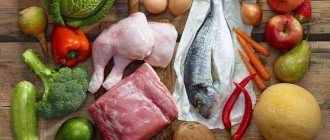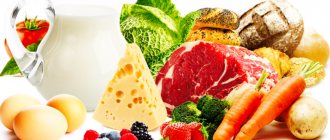Rating: No rating
Pregnancy is a wonderful period in the life of every woman who spends nine months waiting for a small miracle. At the same time, this period proceeds individually for everyone: happily and easily or with toxic torment and constipation. Weight gain during pregnancy is also a rather individual issue.
Many women gain normal weight during pregnancy. But it’s not uncommon for pregnant women to go beyond their normal weight limit, listening to recommendations from relatives to “eat for two.” Therefore, we should understand in more detail the issue of weight during pregnancy, whether it is possible to lose weight during pregnancy and how to do this without harming the child.
Indications for following the diet
Many women do not know whether it is possible to diet during pregnancy and fear for the condition of the fetus. Doctors have long identified the relationship between excessive weight gain and gestosis, which manifests itself in the form of:
- swelling;
- the appearance of protein in the urine;
- hypertension.
This leads to severe complications in the 2nd half of pregnancy. The disease develops against a background of increasing appetite, when a pregnant woman begins to eat “for two.” A negative consequence is fetal hypoxia, which causes a delay in its development.
If in the 2nd trimester a woman gains more than 400-500 g per week, and she does not have edema, then the doctor will recommend that she review her menu and switch to a diet diet.
Due to significant weight gain, a pregnant woman's tissues lose their elasticity, become susceptible to injury and do not stretch well, which ultimately leads to a difficult birth. A woman who has gained many kilograms during pregnancy has a more difficult time returning to normal after giving birth.
Exercises for weight loss
Physical activity during pregnancy helps prevent excess weight gain. But the question arises - what load is permissible to reduce weight? During pregnancy, sudden and fast movements should not be made, therefore running, aerobics, jumping, and cycling are contraindicated.
The following exercises are recommended:
- walking in one place for 1 minute (both on a full foot and on tiptoes);
- rotation of the body - performed smoothly from side to side;
- rotation of the pelvis - smooth circular movements in different directions;
- squats - performed shallowly with a straight back;
- cat - in a position on all fours, when inhaling, the back arches, the stomach tucks in, the head drops, when exhaling - the back bends, the head rises;
- bridge with raising the pelvis - from a lying position with bent knees, the pelvis is raised and lowered.
Interesting article: Healthy diet for edema during pregnancy
In addition to performing the exercises on your own, experts recommend taking a closer look at one of the following areas:
- Pilates. Promotes body flexibility and strengthens the muscular frame of the back.
- Swimming. Improves blood circulation in the body, improves lung function, strengthens muscle groups throughout the body.
- Gymnastics. Helps keep the body in good shape, promotes flexibility, and eases the load on the spinal column.
- Yoga. Most often recommended to women who were familiar with this type of physical activity before pregnancy. Exercises are selected by the trainer individually.
Interesting article: Medical diet 9 during pregnancy
Principles of nutrition
To lose weight, a pregnant woman needs to follow simple food intake rules, as well as a hypoallergenic diet. If there is a sharp increase in body weight, the doctor will recommend fasting days.
Nutrition rules
Dietary dishes should be prepared only from fresh and always natural ingredients. It is important for a pregnant woman to follow certain rules during the diet:
- You can't overeat . After eating, a woman should not experience heaviness in her stomach. It is forbidden to skip meals. If you feel hungry, you are allowed to have a light snack with an apple or natural yogurt.
- Don't put off breakfast . After waking up, you can't take a break. Porridges that are ideal are: buckwheat, corn, oatmeal. They are rich in vitamins and microelements.
- In the first half of the day, doctors recommend that pregnant women eat protein foods, after lunch and in the evening – fermented milk, vegetable and dairy products.
- To avoid swelling, you need to drink a lot of water . To do this, cook jelly, compotes, fruit drinks, as well as brew weak tea and prepare a rosehip decoction.
- The expectant mother is obliged to eat properly . Therefore, the menu should be varied. All natural products are healthy and benefit the child. If you regularly consume only a certain set of foodstuffs, your body will have an excess of some nutrients and a deficiency of others.
- Sugar should be replaced with honey, and sweets with dried fruits, nuts, fresh berries and fruits.
- The best food is steamed, baked, boiled and stewed.
Advice! If you eat flour products and baked goods excessively, fermentation will occur in the intestines, which will lead to unpleasant sensations and cause discomfort.
Authorized Products
There is no need to starve to lose weight. It is enough for a pregnant woman to eat fractionally the right foods. Be sure to include in your diet:
- sour cream, cottage cheese, milk. They supply the body with iron and calcium, which help strengthen the child’s skeletal system. The folic acid contained in the composition will help the fetal nervous system develop correctly;
- porridge;
- meat dishes and those prepared from offal are the basis of protein nutrition;
- vegetables. Broccoli, carrots and spinach are especially beneficial;
- sea fish and seafood. These are sources of vitamin D, magnesium, phosphorus, iodine, protein and zinc;
- kefir;
- fruits. It is worth including avocados in the diet of pregnant women;
- oil;
- egg;
- nuts are a source of phytic acid, selenium, Omega-3, magnesium.
Prohibited Products
During pregnancy, especially at the end of the second and third trimester, it is necessary to exclude several food groups:
- that contain empty calories are baked goods, chips and soda;
- salty, spicy, smoked dishes, which cause severe toxicosis;
- products that can cause allergic reactions: tomatoes, strawberries, citrus fruits, chocolate, cocoa, shrimp. You don’t have to completely abandon them, but the volume must be reduced to a minimum;
- canned food, sausages, fish delicacies;
- If a woman is prone to obesity, then you should not eat foods that cause appetite - onions, rich broth and garlic.
In addition to the above, it is worthwhile for a pregnant woman to reduce the amount of fat she consumes, giving preference to vegetable fats. Adding to dishes should be kept to a minimum:
- lard;
- interior fat;
- spread and margarine.
In this case, the butter should be left, as it contains a large amount of substances beneficial for the pregnant woman.
If a woman is prone to obesity, then foods containing “light” carbohydrates should be excluded from the diet as much as possible. These include baked goods, candies, cookies, jam, and other treats that contain large amounts of sugar.
Condition of the fetus at 10 weeks of pregnancy
At the 10th week, the embryo finally turns into a fetus, its body, internal organs, fingers, and future milk teeth are formed, the brain develops rapidly (250 thousand neurons are produced per minute), the tail disappears, and the diaphragm begins to form. The genitals are not yet so pronounced that it is possible to talk about the gender of the child, however, if a boy develops in a woman’s body, his testicles begin to produce the hormone testosterone.
The weight of the unborn baby is 5 grams, its dimensions are 4 centimeters. During the ultrasound examination, you can already take a picture of the fetus, and also feel how the heart beats.
The 10th week is a kind of milestone, after crossing which a pregnant woman can be 90 percent sure that the baby has no serious pathologies and will “live” safely in the womb until it is born.
Diet menu during pregnancy for weight loss
Excess weight must be dealt with intelligently so as not to harm the child. In each trimester, the body requires certain products that are responsible for the development of the fetus. Therefore, during a pregnant woman’s diet, it is important to create the right menu.
Important! A diet for pregnant women must fulfill 2 tasks: keep the mother healthy and ensure the full development of the fetus.
In 1st trimester
Let's consider the dietary menu in the first weeks of pregnancy.
In the table, meals are divided into 6 times:
| 1 | 2 | 3 | 4 | 5 | 6 | |
| Mon. | Muesli with milk (220 g) | Greek yogurt (120 ml) | Soup (330 ml) | Caesar salad (230g) | Cabbage stewed with rice cereal (330 g) | Mug of warm milk (220 ml) |
| Tue | 160 g cottage cheese, weak tea (preferably green, 160 ml) | Tea (160 ml), cracker (60 g) | Soup (cauliflower or fresh pumpkin, 330 ml) | Orange (230 g) | Chicken meatballs (steamed, 140 g), mashed potatoes (180 g) | Yogurt (low-fat, 120 ml) |
| Wed. | Rice porridge (can be replaced with oatmeal, 220 g) | Bread (80 g) with butter (20 g) | Soup made from seafood or fish (330 g) | 120 g cottage cheese | Spaghetti with liver, baked in kefir (330 g) | Sea kale with vegetables (180 g) |
| Thurs. | 1 bread with processed cheese and tomato (120 g), fermented milk drink (230 ml) | Mandarin (140 g) | Meatball pasta (330 g), salad (150 g) | Nuts (70 g) | Baked potatoes topped with sour cream (330 g), tea (230 ml) | Biokefir (220 ml) |
| Fri. | Hercules porridge (320 ml milk and 70 g cereal) with apple pieces (70 g), natural juice (180 ml) | Banana (220 g) | Tomato salad (220 g), rabbit soup (330 ml), tea (230 ml) | Mandarin (150 g) | Cucumber (100 g), Iceberg lettuce (100 g), dill (20 g) mixed with sour cream (50 ml), turkey cutlet (steamed, 120 g) | Yogurt (120 ml) |
| Sat. | Buckwheat (220 g), natural juice (180 ml) | Yogurt (120 ml) | Cabbage-based soup (330 ml), bread (80 g) | Banana (220 g) | Salad with avocado, tomatoes, salmon and spinach (260 g) | Morse (220 ml) |
| Sun. | Cheesecakes (from 140 g cottage cheese), tea (200 ml) | Dried apricots (80 g) | Vegetable soup with chicken breast cubes (330 ml), bread (80 g) | Applesauce with carrots (180 g) | Iceberg salad with tomatoes and soft cheese (230 g) | 180 ml warm milk |
In the 2nd trimester
During this time, a pregnant woman should definitely eat 6 times, while limiting her fish consumption.
Table of six meals a day:
| 1 | 2 | 3 | 4 | 5 | 6 | |
| Mon. | Oatmeal (220 g) | Apple, banana (about 220 g) | Noodle soup with turkey fillet cubes (330 ml) | 110 g cottage cheese | Vegetable stew with lean meat (320 g) | Yogurt or a mug of kefir (210 ml) |
| Tue | Cheesecakes with raisins (220 g) | A handful of nuts (almonds or walnuts, 80 g) | Lentil soup (330 ml) | Pear (180 g) | Chicken baked with tomatoes (220 g), fluffy rice (120 g), tea (220 ml) | Low-fat yogurt (120 ml) |
| Wed. | Sandwich with a piece of cheese and tomato (160 g), fried egg (from 1 egg) | Cottage cheese (110 g) with raisins (30 g) | Vegetable soup (330 ml) | Yogurt (120 ml) | Vegetable salad with avocado and Iceberg lettuce (240 g) | Morse (180 ml) |
| Thurs. | Omelet (230 g) | Low-fat, natural yogurt (120 ml) | Salmon soup (can be replaced with meat, 330 ml) | Fruit (180 g) | Milk porridge (230 ml) | Vegetable salad (can be replaced with fruit, 220 g) |
| Fri. | Cottage cheese (110 g) with grated berries (60 g) | Bread (80 g) with cheese (30 g) | Tea (190 ml), buckwheat stewed with rabbit (260 g), vegetable salad (220 g) | Juice (220 ml) | Chicken chakhokhbili (260 g), vegetable salad (220 g) | Warm milk (180 ml) |
| Sat. | Sandwich (130 g), omelet (120 g) | Mug of tomato juice (220 ml) | Ratatouille with lean meat (320 g) | Peach (170 g) | Pasta seasoned with tomato sauce (330 g) | Tea (180 ml) |
| Sun. | Porridge (220 g), dried apricots (80 g), juice (180 ml) | Yogurt (120 ml) | Shchi (330 ml), tomato salad with cucumbers and sour cream (220 g) | Nuts (80 g) | Rose hip decoction (230 ml), zucchini pancakes sprinkled with sour cream (270 g). | Morse (230 ml) |
In the 3rd trimester
In the last month of pregnancy, it is worth excluding from the menu foods that put unnecessary stress on the stomach.
A pregnant woman should adhere to the principle - less is better, but healthier. You need to eat more often:
- fruits;
- vegetable and steam dishes.
In the table, the menu is divided into 6 meals: 1 - breakfast, 2 - lunch, 3 - lunch, 4 - afternoon snack, 5 - dinner, 6 - snack before bed.
| 1 | 2 | 3 | 4 | 5 | 6 | |
| Mon. | Porridge (220 g) | Dried fruits (130 g) | Vegetable soup (330 ml) | Kefir (220 ml) | Buckwheat (210 g), steam cutlet (120 g), milk (210 ml) | Mandarin (160 g) |
| Tue | Loaf with butter (120 g), tea (210 ml) | Chopped eggs (2 pcs.), mixed with seaweed (110 g) | Hake soup (330 ml), tea (180 ml) | Cottage cheese (120 g) | Veal (220 g) (can fish) with mashed potatoes (180 g), juice (220 ml) | Fruit salad (220 g) |
| Wed. | Cracker (70 g), tea with milk (200 ml) | Bioyogurt (120 ml) | Pasta with vegetables (330 g) | Vegetable salad containing spinach, olives and tomatoes (220 g) | Dietary pilaf from a multicooker (340 g) | Ryazhenka (180 ml) |
| Thurs. | Cottage cheese (110 g) with the addition of grated berries (90 g), which can be replaced with jam | Juice (180 ml) | Herbal tea (180 ml), roast rabbit with vegetables (260 g). | Fruit (180 g) | Fluffy rice cooked with steamed vegetables (330 g) | Kefir (180 ml) |
| Fri. | Boiled egg, buttered bread (120 g), herbal tea (180 ml) | Fruits | Vegetable salad (130 g) and borscht (330 ml) | Pear (160 g) | Salad of boiled fish, rice and eggs (280 g) | Bioyogurt (120 ml) |
| Sat. | Cheesecakes (130 g). You can add sour cream | Nuts (90 g) | Pasta with hake cutlet (230 g), vegetable salad (220 g), tea (180 ml) | Fruit (180 g) | Lazy cabbage rolls (330 g), green tea (180 ml) | Mug of milk (220 ml) |
| Sun. | Hercules porridge (220 g), dried apricots (80 g) | Sandwich with lightly salted trout (130 g) | Cream soup (330 ml), baked tomatoes with turkey breast (230 g) | Kefir and berry smoothie (240 ml) | Rice with boiled mackerel (330 g), tea (180 ml) | Biokefir (120 ml) |
What will help you avoid gaining excess weight?
The most awaited time in a woman’s life has come - you found out that you are going to become a mother. This is a great reason to acquire healthy habits. Keep these habits during, after pregnancy and for the rest of your life.
- Weight control. On average, you should gain up to 1 kg in one month.
- Walking and physical activity. Visiting the gym and strength training will have to be postponed for these 9 months. But swimming in the pool, exercises on a fitball, walking, gymnastics and yoga for pregnant women are just the thing!
- Get enough sleep. Lack of sleep threatens weight gain. This is how the body protects itself from negative influences and turns on its protective functions. 7-8 hours is a normal amount of sleep. You shouldn't sleep too long either. The calories eaten throughout the day should be “shaken out.”
- Balanced diet. A varied diet will help you gain weight within acceptable limits.
Special diets for pregnant women
Any diet should be carried out under the strict supervision of a gynecologist, as there may be contraindications that only a specialist can report. A pregnant woman should not adhere to the same type of diet for a long time, since the food should be varied.
Salt-free
A salt-free diet is necessary for a pregnant woman to:
- reducing the load on internal systems and organs;
- prevention of heart, liver and kidney diseases;
- getting rid of extra pounds;
- reducing swelling that occurs due to metabolic disorders.
This diet can be followed for no more than 2 weeks. In this case, the time recommended by the gynecologist should be strictly observed.
| Should be consumed | It is forbidden to eat |
|
|
For sweets, a pregnant woman can enjoy natural confiture or jam.
Hypoallergenic
This diet is recommended for pregnant women with gastroenteric allergies, intolerance to a number of foods, which are conventionally divided into:
- highly allergenic. They are completely excluded from the pregnant woman’s diet;
- moderately allergenic. Their consumption is limited;
- hypoallergenic. These are ingredients that are well tolerated by pregnant women.
| Highly allergenic | Moderately allergenic | Hypoallergenic |
|
|
|
You can follow the diet from 14 days to six months. In this case, a pregnant woman should regularly consult a specialist.
Apple
Due to significant weight gain in a pregnant woman, a gynecologist may prescribe a fasting day on apples. If the case is particularly advanced, a long-term diet may be necessary.
Buy 1 kg of green apples per day and divide them into 5 meals.
| Eating | Method of use |
| 1 | Eaten fresh. |
| 2 (2 hours after the first meal) | Finely grated fruits with a drop of vegetable oil. |
| 3 (lunch) | Applesauce with celery root and parsley, seasoned with 20 g of natural yoghurt. |
| 4 | Fresh apples or juice squeezed from them. |
| 5 (dinner) | Applesauce with prunes. Can be alternated with baked apples. |
When prescribing a long-term apple diet, protein foods should be added to the pregnant woman’s diet in the first half of the day, as well as some complex carbohydrates.
Curd
A cottage cheese diet is recommended in case of a violation of the eating regimen, when a woman indulges an increased appetite and excludes healthy foods from the diet.
Fasting days are arranged no more than once a week. A pregnant woman is allowed to eat no more than 500 g of cottage cheese and drink 500 ml of kefir per day. The specified volume is divided into 5 times.
Buckwheat
Buckwheat helps stabilize a pregnant woman’s weight. During the diet, you should eat one boiled cereal daily. You can cook porridge with milk, opting for low-fat milk.
For breakfast, buckwheat seasoned with kefir is ideal for a pregnant woman. Adding parsley to the composition will help improve the taste of the dish. Salt should be used in a minimal amount, as it can cause swelling.
A long-term mono-diet will cause poor health in the mother and fetus. Therefore, such a diet cannot be followed for more than 7 days. From the second week you should combine buckwheat with:
- stewed fish;
- rabbit;
- vegetables;
- poultry meat;
- stewed liver;
- fruits;
- seafood.
A pregnant woman can switch to a buckwheat diet only as prescribed by a specialist.
Advantages and disadvantages
| pros | Minuses |
|
|
Main conclusions
A diet for pregnant women is a necessary measure associated with gaining excess weight or deteriorating health. The choice of foods consumed should be discussed with a nutritionist or gynecologist. During pregnancy, a woman must receive all the necessary nutrients so as not to harm the fetus.
In the process of creating a menu, it is imperative to exclude all canned food, sausages and smoked products, spicy and fried foods. The dish can be steamed, baked or stewed. A special diet based on one product cannot be followed for a long time.
Tell us what diet you followed during pregnancy and whether there were any results. How did you deal with swelling and excess weight? What diet do you think an expectant mother should not follow?
Contraindications
Many conditions can be contraindications to the diet, which are determined directly by a gynecologist.
Examples of conditions in which diet is unacceptable include:
- Inflammatory processes of the gastric mucosa.
- Recovery period after illnesses.
- Acute infectious and inflammatory pathologies.
- Peptic ulcer of the stomach and duodenum.
- Intolerance to certain foods.
Interesting article: Proper nutrition and menu for pregnant women for every day
Products that must be present in the diet
The diet of a pregnant woman should be as thoughtful as possible in order to fully satisfy the needs of both mother and baby for the necessary substances.
“Overweight pregnant women have a high probability of premature labor, miscarriages, and gestational arrest. In addition, excess weight of a woman in labor is one of the indicators for a cesarean section.”
Svetlana Titova
The diet for a pregnant woman and nutrition in general must include the following products:
- veal, beef, poultry;
- milk;
- various types of cheeses;
- fruits and vegetables;
- cereals;
- dried fruits.
They contain the necessary amounts of proteins, fats and carbohydrates, so they should be served every day.











